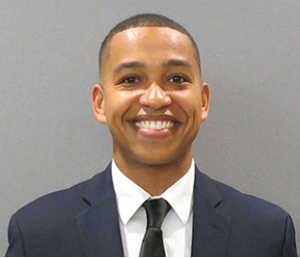-
About
- Departments & Offices
-
Academics
- Public Health
- Biomedical Sciences
- Physician Assistant
- Special Master’s (MBS)
-
Admissions & Financial Aid
- Tuition & Fees
-
Student Experience
-
- Student Resources by Program
- Academic & Student Support
- Wellness & Wellbeing
- Student Life
- Events & Traditions
-
-
Research
- Research Labs & Centers
- Tufts University-Tufts Medicine Research Enterprise
-
Local & Global Engagement
- Pathway & Enrichment Programs
- Global Health Programs
- Community Engagement
Wellness Student Spotlight: Anthony Norman, M20
"Time management and staying organized have been critical components for balancing my academic and social responsibilities. The work-life balance isn’t even at every given moment, but there should be a balance over the long haul."

How have you balanced your academics and your personal life as a student?
Time management and staying organized have been critical components for balancing my academic and social responsibilities. The work-life balance isn’t even at every given moment, but there should be a balance over the long haul. There are times when my academics needed to be my sole focus (exams, USMLE, while on the wards, etc.). But I tried to make an effort to spend time with family, friends and my fiancé when my academic responsibilities weren’t as pressing. Effective communication and setting expectations made it easier to coordinate with loved ones and allowed me to take full advantage of my study time as well as my free time.
What surprised you about the MD program and living in Boston?
I’m originally from Boston, so I wasn’t particularly surprised by much. Although, I did find myself checking out some of the restaurants in Chinatown, which were delicious! Regarding the MD program, I was most surprised by the early exposure to patients and to what extent I could be involved in patient care. During some of my internships, I felt I was a valuable member of the team and my clinical findings and ideas directly impacted patient care. It was the first time I felt like I was truly being a doctor. It was exciting!
What do you do for fun and do you anticipate that will change as you transition to residency?
In my spare time, I like to spend time with friends, visit my fiancé, play basketball, run and maybe catch an occasional show at the Wang Theater when student tickets are affordable. The hours for residency will definitely be demanding, especially as a surgical resident. I hope to be able to keep up with all the aforementioned. But, I may not be able to do everything as regularly as I currently do. As I get further along in my training, my priorities will focus and I’ll carve out time for the things that truly matter the most.
What is your favorite healthy snack?
I’m not a big snacker but I like fruits, nuts and protein bars (that follow the Altman rule).
How do you de-stress and how do you plan to carry that through to residency?
I usually will wind down the day with some Netflix. I also find that exercising is really helpful, especially if I can go for a run outside at the park near my house that has a nice view. Otherwise, I like to spend quality time with friends and family; maintaining those relationships is very rejuvenating for me. While I’ll have less time to do all of the above, I will try to prioritize them when I get a day off here and there. I’ll also try to incorporate them in my daily routines as much as possible. I’m a big fan of calling my friends/family on my commute back home (via Bluetooth to be safe).
What do you wish you knew at the start of med school and what advice would you give to your future self?
Studying a little bit every day is more effective than trying to cram at the last minute. If you see something interesting on the wards, read about it that night. Incorporate your healthy activities into your daily routine rather than as an add-on.
Shadow more physicians in the pre-clinical years. There are numerous specialties that you won’t gain exposure to in your core clerkships. Many faculty are open to having medical students shadow them.
What pearls of wisdom would you like to impart to M21, M22, and M23 students?
Medical school can be challenging, but many have done it before you. You made it here, stay the course, and do the best you can. Don’t be ashamed to ask for help. EVERYONE stumbles, but Tufts School of Medicine students match at phenomenal residency programs. Along the same vein, a support network is key. Share with them your ups and the downs. When you hit the wards, study early. Engage the educational opportunities in front of you. You’ll carry many of the clinical pearls you’ll learn during these years with you. You aren’t “just” the medical student. You have the opportunity to change the trajectory of patient care. Be the doctor. Mentorship is crucial, and not every mentor is the same. Have a few: academic/career mentor, life mentor, research mentor, clinical mentor, etc..
Tufts School of Medicine is amazing, but everyone does things different. I highly valued the two away rotations I did. I saw different pathology, different approaches, different surgical techniques, and different cultures. It helped inform me about what I should value in a residency program. Medical school is challenging, but you’ll be amazed at how much you have learned by the end as well as humbled by how much you don’t know. You’re gaining the tools to ultimately be an independent physician that is a life-long learner. Embrace that! Lastly, study hard, but have some fun along the way. Laugh as much as you can. Grab dinner with your friends. Call your family.